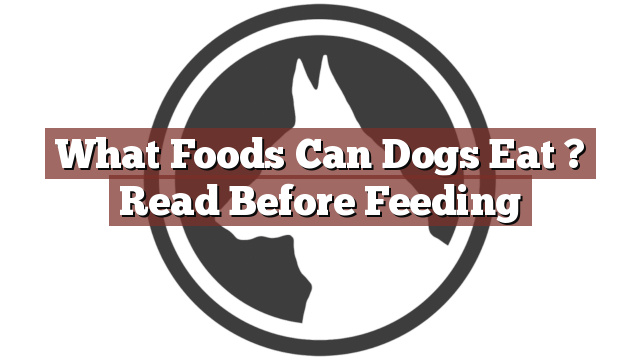Understanding Your Dog’s Dietary Needs
Feeding your dog a proper diet is essential for their overall health and well-being. Just like humans, dogs have specific nutritional needs that must be met in order to thrive. It is important to understand what foods are safe for dogs to eat and which ones should be avoided. By providing a balanced and nutritious diet, you can ensure that your furry friend stays healthy and happy.
What Foods Can Dogs Eat? Read Before Feeding
When it comes to feeding your dog, it is crucial to be aware of which foods are safe for them to consume. While dogs are primarily carnivores, they can also benefit from certain fruits, vegetables, and grains. Can dogs eat grapes? No, grapes and raisins are toxic to dogs and can cause kidney failure. Can dogs eat chocolate? No, chocolate contains theobromine, which is toxic to dogs and can lead to vomiting, diarrhea, and even death. Can dogs eat apples? Yes, apples are safe for dogs to eat, but make sure to remove the seeds and core as they can be harmful.
In addition to fruits and vegetables, dogs can also eat lean meats such as chicken, turkey, and beef. These meats should be cooked thoroughly and served without any seasoning or bones. Dairy products like cheese and yogurt can also be given to dogs in moderation, as long as they are not lactose intolerant. It is important to note that every dog is different, and some may have specific dietary restrictions or allergies. Always consult with your veterinarian before introducing new foods into your dog’s diet.
Pros and Cons of Feeding It to a Dog
Feeding certain foods to your dog can have both pros and cons. For instance, incorporating fruits and vegetables into their diet can provide them with essential vitamins, minerals, and fiber. This can improve their digestion and overall health. However, some fruits and vegetables may cause digestive upset or allergic reactions in certain dogs. It is important to introduce new foods gradually and observe any changes in your dog’s behavior or health.
While lean meats are a great source of protein for dogs, it is important to ensure that they are cooked properly and served plain. Seasonings, spices, and fatty cuts of meat can cause digestive issues and even pancreatitis in dogs. Additionally, dairy products can be beneficial for dogs that are not lactose intolerant, as they provide calcium and probiotics. However, some dogs may experience stomach upset or diarrhea from consuming dairy. Monitoring your dog’s individual response to different foods is key in determining what is safe and healthy for them.
Conclusion: Providing a Balanced and Safe Diet for Your Canine Companion
In conclusion, it is crucial to understand the dietary needs of your dog and provide them with a balanced and safe diet. While dogs can benefit from certain fruits, vegetables, and lean meats, it is important to be aware of foods that can be toxic or harmful to them. Always consult with your veterinarian before introducing new foods into your dog’s diet, especially if they have any dietary restrictions or allergies. By being mindful of what you feed your furry friend, you can ensure that they live a long and healthy life.
Thank you for taking the time to read through our exploration of [page_title]. As every dog lover knows, our furry friends have unique dietary needs and responses, often varying from one canine to another. This is why it's paramount to approach any changes in their diet with caution and knowledge.
Before introducing any new treats or making alterations to your dog's diet based on our insights, it's crucial to consult with a veterinarian about [page_title]. Their expertise ensures that the choices you make are well-suited to your particular pet's health and well-being.
Even seemingly harmless foods can sometimes lead to allergic reactions or digestive issues, which is why monitoring your dog after introducing any new food item is essential.
The content provided here on [page_title] is crafted with care, thorough research, and a genuine love for dogs. Nevertheless, it serves as a general guideline and should not be considered a substitute for professional veterinary advice.
Always prioritize the expert insights of your veterinarian, and remember that the health and happiness of your furry companion come first.
May your journey with your pet continue to be filled with joy, love, and safe culinary adventures. Happy reading, and even happier snacking for your canine friend!

